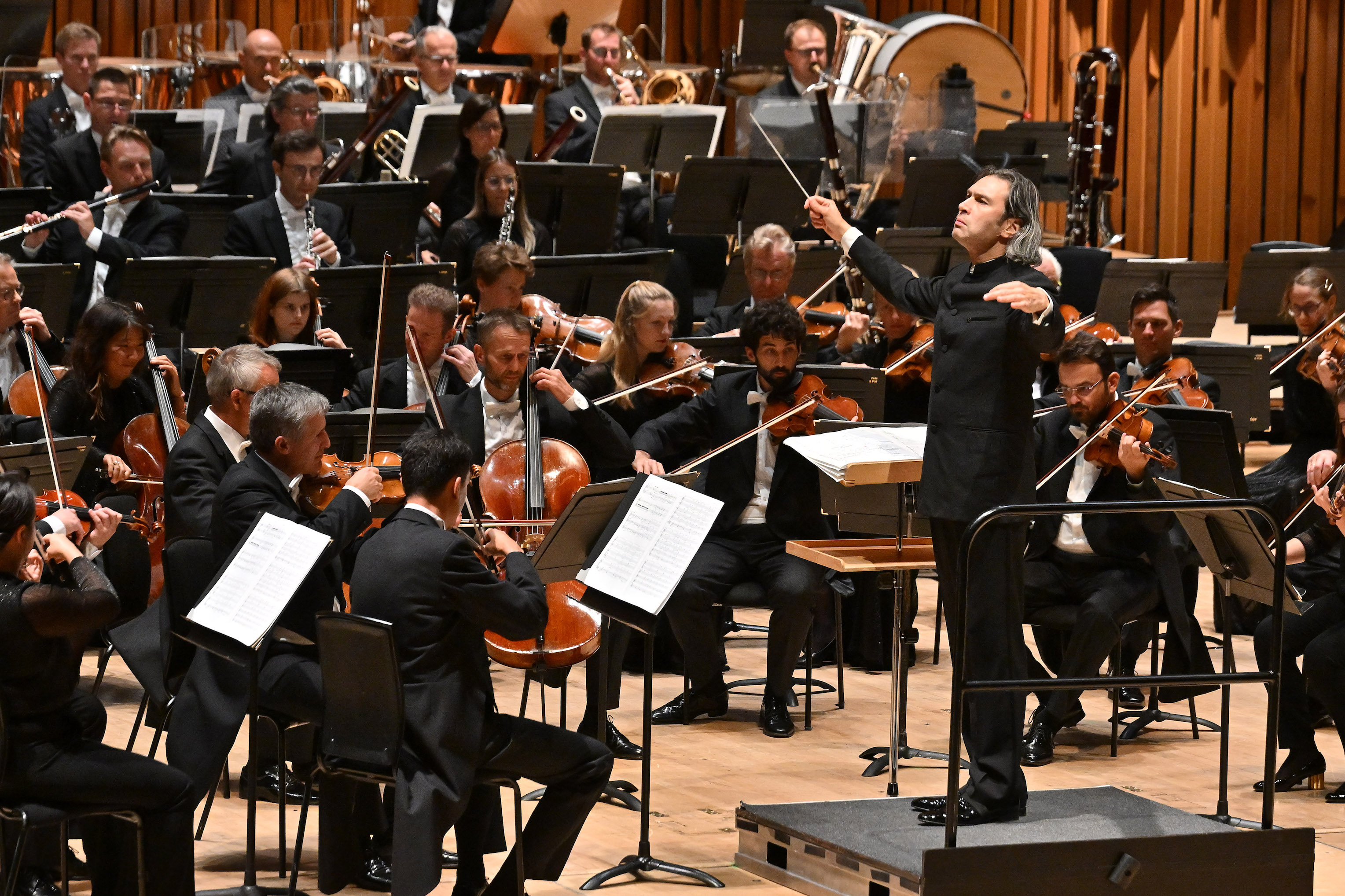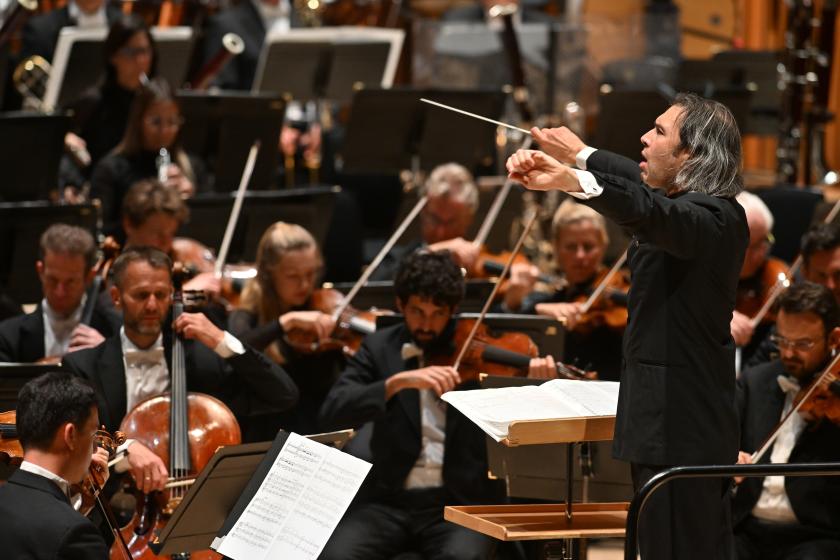These days British orchestras count themselves lucky if they can see, and plan, five years ahead. In Bavaria they do things rather differently. As the ducal court ensemble, and later the house band of the Munich opera, the Bayerisches Staatsorchester can trace its history back to 1523. Last night the BSO, as part of a six-country tour to mark its 500th anniversary, arrived at the Barbican with the first of two programmes conducted by music director Vladimir Jurowski.
Their opening concert began with a hauntingly meditative work by the contemporary Ukrainian composer Victoria Poleva; then the flames kindled by Berg’s violin concerto, with Vilde Frang as soloist, ignited into a blazing post-interval account of a local speciality: Strauss’s Alpine Symphony. And we still had a glorious encore to come.
From first bar to last, we could just sit back and enjoy the Bavarians' lusciously rich and refined string sound, mightily assured brass, and woodwind parts executed with dazzling flair and grip. But, even given the somewhat straitened acoustic of the Barbican Hall, this gratifying blend of plushness and exactitude was Jurowski’s triumph too. Calm, relaxed, authoritative, he highlighted fine details with a vigilant agility, unfussy tempi, while never letting the luxury vehicle at his command run on pure force without finesse.
The long, slow-moving orchestral paragraphs of Poleva’s White Interment (2002) introduced us to the deeply satisfying grain and sheen of the BSO sound. A kind of aural snowscape, with instrumental whorls, eddies and flurries breaking free from the monumental drift of the strings, it builds in its rhapsodic tonality towards a mood of contemplative bliss: the type of aura you might expect to find in the music of Pärt or (even further north) Rautavaara. Sure enough, eerie birdcalls in the woods – and even hints of distant chanting – began to penetrate the driving, surging snow.
 After Poleva’s hushed iteration and hypnotic stasis, Berg’s Violin Concerto grabbed and held us as a much more impassioned, even frankly Romantic, work than it can sometimes feel like. Frang (pictured above) imbued Berg’s aching, soaring elegy for 18-year-old Manon Gropius with passion as well as prowess. She didn’t stint on sensuous vibrato or even – in the first movement that evokes Manon’s brief life – a sort of Viennese salon charm. But there was stabbing anguish and biting dread when, in the second section, the angel of death swoops and strikes (Manon died of polio in 1935). Jurowski helped the BSO reveal the concerto’s tender balance between serialist rigour and almost-nostalgic lyricism. From harp to basses, strings glowed as echoes of the waltz haunt the score. Perky, even droll, woods burbled, while Berg’s surprising alto saxophone made its presence felt. The healing harmonies of the Bach chorale (“Es its genug”) that solaces the violin’s anguish had a transfixing power, while the quiet rapture of Frang’s final sustained vibrato seemed to open heaven’s gates.
After Poleva’s hushed iteration and hypnotic stasis, Berg’s Violin Concerto grabbed and held us as a much more impassioned, even frankly Romantic, work than it can sometimes feel like. Frang (pictured above) imbued Berg’s aching, soaring elegy for 18-year-old Manon Gropius with passion as well as prowess. She didn’t stint on sensuous vibrato or even – in the first movement that evokes Manon’s brief life – a sort of Viennese salon charm. But there was stabbing anguish and biting dread when, in the second section, the angel of death swoops and strikes (Manon died of polio in 1935). Jurowski helped the BSO reveal the concerto’s tender balance between serialist rigour and almost-nostalgic lyricism. From harp to basses, strings glowed as echoes of the waltz haunt the score. Perky, even droll, woods burbled, while Berg’s surprising alto saxophone made its presence felt. The healing harmonies of the Bach chorale (“Es its genug”) that solaces the violin’s anguish had a transfixing power, while the quiet rapture of Frang’s final sustained vibrato seemed to open heaven’s gates.
After tragedy, triumph – but never crude triumphalism. With the Alpine Symphony, Jurowski aimed not just to deliver overwhelming firepower – though he did unleash just that at moments – but to map the grand arc of a journey on which periods of rest and play count as much as the strenuous storming of the peaks. I confess that I can never quite follow the fussily programmatic aspects of Strauss’s 24 hours in the mountains – have we reached the flowery meadows yet, and can you spot the glacier? No matter: Jurowski made the symphony’s epic emotional trek as limpid, sparkling and free-flowing as a just-thawed stream.
 Perhaps the Barbican pinched the expansive BSO sound a little, but individual desks gleamed and dazzled. At the back two hulking tubas – Stefan Ambrosius and Steffen Schmid – lorded over the landscape like gods of the summits, with radiant trumpets and mellow horns beside them firm and bold. If the offstage brass seemed a bit less magical than they can be – again, blame the hall. But the organ (Johannes Berger) made resonant marks along the Alpine trail and, at the edges, some wonderfully assured woodwind solos sang from the forest.
Perhaps the Barbican pinched the expansive BSO sound a little, but individual desks gleamed and dazzled. At the back two hulking tubas – Stefan Ambrosius and Steffen Schmid – lorded over the landscape like gods of the summits, with radiant trumpets and mellow horns beside them firm and bold. If the offstage brass seemed a bit less magical than they can be – again, blame the hall. But the organ (Johannes Berger) made resonant marks along the Alpine trail and, at the edges, some wonderfully assured woodwind solos sang from the forest.
On the earlier parts of the journey a sort of polished rusticity prevailed. Jurowski injected a certain dainty elegance into the climb. Yet that sense of an excursionist’s weekend jolly only made the sudden tutti onset of sublimity – the “sunrise” theme, and later a hall-shaking storm – the more shattering. All the while, the BSO strings – led by David Schultheiss – enrobed us in their gorgeous full-cream chocolate, with ravishing cellos and basses. If anything, the delicate calm of post-tempest twilight hush impressed even more than the storm’s climax, when whirring wind-machine and thunderous timpani (almost) blew the house down. Given this closing serenity, it made sense for Jurowski to choose as his encore not some brash fortissimo stunt but the Act III Prelude from Wagner’s Die Meistersinger. Quietly pulsing strings and gorgeously burnished horns carried us gently into a mystic realm where, perhaps, even the super-talented Strauss could never reach. The tantalising coda hinted that Jurowski’s Bavarians might have even more splendid vistas to discover.














Add comment